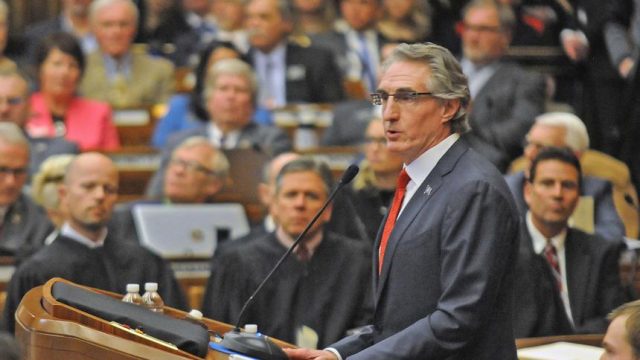State Law Does Not Prohibit Doug Burgum From Threatening a Veto

TOM STROMME.Tribune Governor Doug Burgum opened North Dakota's 65th legislative assembly on Tuesday afternoon in front of a joint session of the legislature where he delivered the State of the State address. Gov. Burgum touched on a number of topics in the address but a continuing theme was lifelong education. "Learning begins with humility. Everyone has something to teach us," he said.
One of the many peculiarities of the North Dakota legislative process is legal prohibition on the governor threatening to veto legislation. It’s widely understood in political circles that the state constitution does not allow the governor to say whether he would veto a bill.
Reporter Tu-Uyen Tran, writing about controversy over legislation regarding economic incentive programs, stated that as fact in a recent article. “State law forbids governors from threatening vetos—they could lose their job—so [Burgum] won’t say what his response would be if the Senate goes along with the House on HB 1182,” Tran wrote.
Only, that’s not actually the case.
Attorney Sean Foss wrote about this today as well, and I wouldn’t pile on except that he looked at the state’s restriction on the governor talking about a veto from a constitutional perspective. He finds that the prohibition is unconstitutional, and I agree.
Even just on a 1st amendment grounds, I don’t see how it’s legal for the governor to be prohibited from communicating his intentions with regard to a veto.
But there’s also the fact that the state constitution isn’t nearly so restrictive when it comes to veto talk as many think.
Here’s Article V, Section 10 of the North Dakota Constitution in full:
That’s some dense language, but if you read carefully there is no specific prohibition on the governor saying he’ll veto a given piece of legislation. Rather, the prohibition is on the governor or his representatives menacing “any member by the threatened use of the governor’s veto power… in consideration that any member shall give the member’s official vote or influence on any matter pending or thereafter to be introduced into either house of the legislative assembly.”
The governor is clear to say, generally, that he’ll veto a bill. He just can’t say to a particular lawmaker, or group of lawmakers, that they have to do a thing (vote a certain way, etc.) or he’ll veto a bill.
This isn’t a criticism of Burgum, mind you. As you can see, the stakes are high for violating this part of the state constitution. If Burgum or any other governor crosses the line the penalty is removal from office. You can understand their decision to err on the side of caution when it comes to talking about vetoes.
Even as written, this part of the state constitution goes too far. The governor should be allowed to tell us whether he’d veto a given bill or not. That’s information lawmakers should be aware of, as well as the general public.
If the governor’s ability to communicate his veto intentions results in some political horse trading, well, that’s politics.





